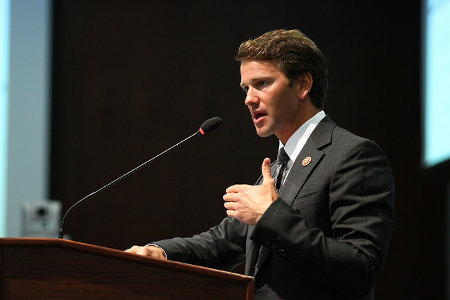USApp Managing Editor, Chris Gilson looks at the best in political blogging from around the Beltway. Our round-up of state blogs will follow on Saturday afternoon.
President Obama, the Democratic Party, and the GOP
On Monday, the Monkey Cage asks whether President Obama has delivered the ‘most transparent’ administration in history. They say that despite that this being one of his major election promises, his record falls short of what he promised, especially given that the administration has prosecuted more leakers under the Espionage Act than all others combined.
This summer, President Obama’s signature healthcare reform, the Affordable Care Act, faces a challenge in the Supreme Court. The Volokh Conspiracy looks at what President Obama’s options might be if the subsidies for the federal exchanges set up by the Act were thrown out. They say that there are very few administrative actions that the Obama administration will be able to take if it loses the case.
On Tuesday this week, Red State critiques President Obama for his net neutrality plans, writing that by letting government into the process, market distortions will only expand, and that the Federal Communications Commission should not be trying to pick winners and losers.
President Obama was also in the news this week for his statement in support of mandatory voting. Outside the Beltway argues that the comments, made by the President in a speech in Cleveland, are wrong since they would be forcing people to choose between two candidates that they may not like, and also states that as a form of free speech, compulsory voting might violate the First Amendment.
Negotiations between Western nations and Iran over the latter’s nuclear program are due to end by March 31st, and President Obama is in favor of making a deal with the country. National Journal says this week that Obama is ignoring public opinion – with a majority believing that a deal would not prevent Iran from getting a nuclear weapon – at his peril, especially as many in Congress on both sides of the aisle are wary of a deal.
This week saw Congressional Republicans release their annual budget resolution. Roll Call’s Hawkings Here comments that the budget is a test of the GOP’s competence in governing, with budget committees in the House and Senate due to debate their differing spending plans.
Elections and the road to 2016
On Monday, Crooks & Liars looks into a plan in Michigan to change the way that the state awards its electoral votes in presidential elections. They say that two bills now moving through the Michigan state legislature would award electoral votes proportionately rather than the winner-takes-all approach currently in use. Meanwhile The Federalist argues that Iowa should have to earn its current top spot on the presidential primary calendar. They say that Iowa’s position in the primary cycle means that there is a shameless pandering to corn interests in the state, and that the state’s GOP presidential caucus has only picked a winner once in seven cycles. Roll Call’s Rothenblog also looks at the mechanics of choosing election candidates, commenting this week that while they can be expensive and divisive, primaries are not all bad. They say that as was the case in 2008 with the then Senator Barack Obama, a competitive primary can sharpen a candidate for the general election.
Moving on to the 2016 presidential campaign, this week National Journal looks at what they term are the ‘vocal acrobatics’ currently being undertaken by the various potential candidates in order to nor run afoul of campaign finance rules. They say that by not officially declaring their candidacy, they are able to raise more money, and have to disclose less of what they are doing.

On Tuesday, Roll Call’s Rothenblog reports on the ‘fearsome foursome’ of Jeb Bush, Rand Paul, Scott Walker and Marco Rubio, all of who they say will be able to wage serious campaigns for the GOP’s 2016 presidential nomination given their popularity and fundraising ability. On Wednesday, Crooks & Liars writes that Jeb Bush has come out in favor of the elimination of the Federal Minimum Wage, stating that it should be left up to private companies. On Thursday, Political Animal looks at this week’s dismissal of Liz Mair by Scott Walker’s presidential campaign, following a tweet criticizing Iowa’s premier status in presidential primaries. They say that the firing of the digital strategist show that Walker is one for flip-flopping and pandering to the right of his party.
Next year’s presidential field for the Republican Party is looking to be one of the largest and most open in recent history. Included in that field is former surgeon, Dr Ben Carson, and former Hewlett Packard and AT&T executive, Carly Fiorana. Red State writes this week that we should not treat either of them as novelties, given that they do not fit the traditional Republican mold, and that the party should stay focused on who can actually win the presidency in 2016.
Moving on to the Democratic Party, The Left Coaster reports this week that according to recent polls, former Secretary of State, Hillary Clinton, is still beating all GOP challengers by double-digits, with her lead over Jeb Bush and Scott Walker as high as 15 points. Political Animal, meanwhile, looks at predictions on whether the former Governor of Maryland, Martin O’Malley will run against Clinton for the nomination. They say that if he is planning to run – even if Clinton is as well – then he could have used St Patrick’s Day this week to make such an announcement. National Journal writes this week that the 2000 presidential candidate for the Democrats, Al Gore, is looking hotter, and gives six reasons for his reemergence as a candidate, including that he is still the most visible figurehead for the climate change community, and that many Democrats are becoming worried about Clinton’s 2016 campaign. The Federalist looks further into the recent concerns over Clinton’s candidacy, commenting that the Democrats have an ‘astonishingly’ weak bench of potential candidates.
Government, the Beltway and Congress’ agenda
This week the Federal Reserve Bank dropped its past assurance that it would be ‘patient’ on raising interest rates, meaning that rises could occur by the summer. Townhall looks at how the Fed is defining inflation and what it means when it says it expects inflation to return to its 2 percent objective in the ‘medium term’. They say that the Fed will simply do whatever it wants, as it has done in the past. The Daily Signal, meanwhile reports that the debt limit has returned as of Monday, and that since Congress suspended the limit last February, it has grown by nearly $1 trillion. They say that this has added more than $2,800 in government debt for every American. On Monday, Daily Kos details what they say are five looming fiscal crises of 2015, including the highway trust fund running out of money at the end of May, and a potential government shutdown at the end of September.
The big news out of Congress this week was the GOP’s release of their annual budget, which was much discussed and dissected by commentators from all parts of the political spectrum. Wonkblog says that the House Republicans’ budget contains a ‘mysterious’ $1.1 trillion in spending cuts over ten years be reducing outlays for mandatory spending. The budget aims to achieve $5.5 trillion in savings in order to achieve balance. United Liberty, meanwhile writes that the Chairman of the House and Senate Budget Committees have proposed good budgets which will see spending increases of $1 trillion less than that proposed by President Obama.

In other House business, this week also saw Representative Aaron Schock (R-IL), resign following continued questions over his expenses. Crooks & Liars comments that Schock was once considered by some as a potential future president.
In the Senate this week, Democrats prevented the advancement of a human trafficking bill of which the Republicans had added anti-abortion elements. PoliticusUSA says that the vote was another defeat for Senate Majority Leader Mitch McConnell, who has resorted to sneaking pieces of the GOP’s agenda into unrelated legislation.
Foreign policy, defense and trade
In the early part of the 2000s many Americans fell out of love with France because of that country’s opposition to the war in Iraq. The American Interest reports this week that Americans’ favorability towards France is now at 82 percent, likely boosted because of the January attack on Charlie Hebdo.
On Tuesday, Wonkblog looks at one part of China’s trading relationship with the U.S. While the U.S. imports a large amount of manufactured goods to China, China imports a great amount of agricultural products from America. They say that rising costs of labor and land, together with concerns about food safety have meant that China has lagged in its agricultural exports.
This week, the White House Dossier says that in a recent interview, President Obama is trying to blame his predecessor, George W. Bush for his own failure in allowing ISIS to bloom in Iraq. They write that Bush handed Obama a stable Iraq, and that had a residual U.S. troop force remained, it could have helped the Iraqis prevent ISIS from taking so much territory. Staying on Middle East politics, Townhall comments on what they say are the ‘inconvenient truths’ of Senator Tom Cotton’s letter last week to senior officials in Iran’s government over negotiations over that country’s nuclear program. They say that Cotton’s letter was correct in its statement that the deal as it stands would be nonbinding, with the next president able to revoke it easily.
On Thursday, The Atlantic looks at what Benjamin Netanyahu’s victory in Israel’s election will mean for America. They say that there is massive difference of opinion in the U.S. and Israel over this with many making comparisons with George W. Bush’s re-election after the 2003 Iraq War.
Obamacare and health policy
On Sunday, Daily Kos looks at the Republican Party’s solution to the problem of Obamacare subsidies, should the Supreme Court find against them in the King v. Burwell case that is currently before it. They say that the GOP (via Nebraska Senator Ben Sasse) have proposed that current policyholders would receive a tax credit worth 65 percent of their plan’s cost for six months, and that this would slowly decrease, ending after 18 months.
On Tuesday, Crooks & Liars reports on one major aspect of the GOP’s new budget – that it repeals the Affordable Care Act, and privatizes Medicare. They say that Medicaid funding would be cut substantially over ten years, with the money given to states as block grants. Hit & Run meanwhile comments on efforts towards a Medicare ‘doc fix’, which would cancel the program’s Sustainable Growth Rate (SGR) formula, which Congress has had to amend many times in order to avoid the payment reductions it calls for. They say that the new proposal would replace the SGR with additional means testing to Medicare’s physician and drug components, but that there are still questions of how it would be paid for, and when.
The economy and society
This week Wonkblog reports on the sad state of equal pay in America. They write that according to a new study, women will not reach pay parity until 2058, with some states not closing the gender pay gap until well into the 22nd century. Staying on matters of income, The Daily Signal says on Wednesday that the top 1 percent of U.S earners pay 35 percent of Federal income taxes.
The Brennan Center for Justice examines the puzzling problem of people overestimating crime rates. They say that while crime has fallen massively since 1991, most Americans still feel it is on the increase. They say the public may not have recovered from the surge in crime between the 1960s and the 1980s, and that sensationalist media coverage of isolated crimes may have also contributed to the public’s misperception that crime is on the increase.
On Tuesday this week Hit & Run comments on new research that shows that one in three Americans hide data from the government, and says that given the high level of government surveillance, we should too.

For 40 years, the U.S. has banned the export of crude oil – a ban that was put in place because of the embargoes levied by the Organization for Petroleum Exporting Countries in the 1970s. The Daily Signal argues this week that it is now time to lift this ban in order to promote further production, which in turn would lead to new jobs.
And finally…
Wonkblog looks at the strange things that people Google across the fifty states, by using the autocomplete for the phrase “How much does * cost in…” – for Washington it’s ‘passport’, and Florida, ‘abortion’.
Outside the Beltway reports on Tuesday that (somewhat improbably), former GOP presidential candidate, Mitt Romney has agreed to a charity boxing match with former heavyweight champion Evander Holyfield.
Roll Call’s Heard on the Hill looks at the White House’s recent online grammar flubs, including misspelling ‘Capitol’ in a website piece on St Patrick’s Day.
Featured image credit: World Economic Forum (Flickr, CC-BY-NC-SA-2.0)
Please read our comments policy before commenting.
Note: This article gives the views of the author, and not the position of USApp– American Politics and Policy, nor of the London School of Economics.
Shortened URL for this post: http://bit.ly/1ExILqS






